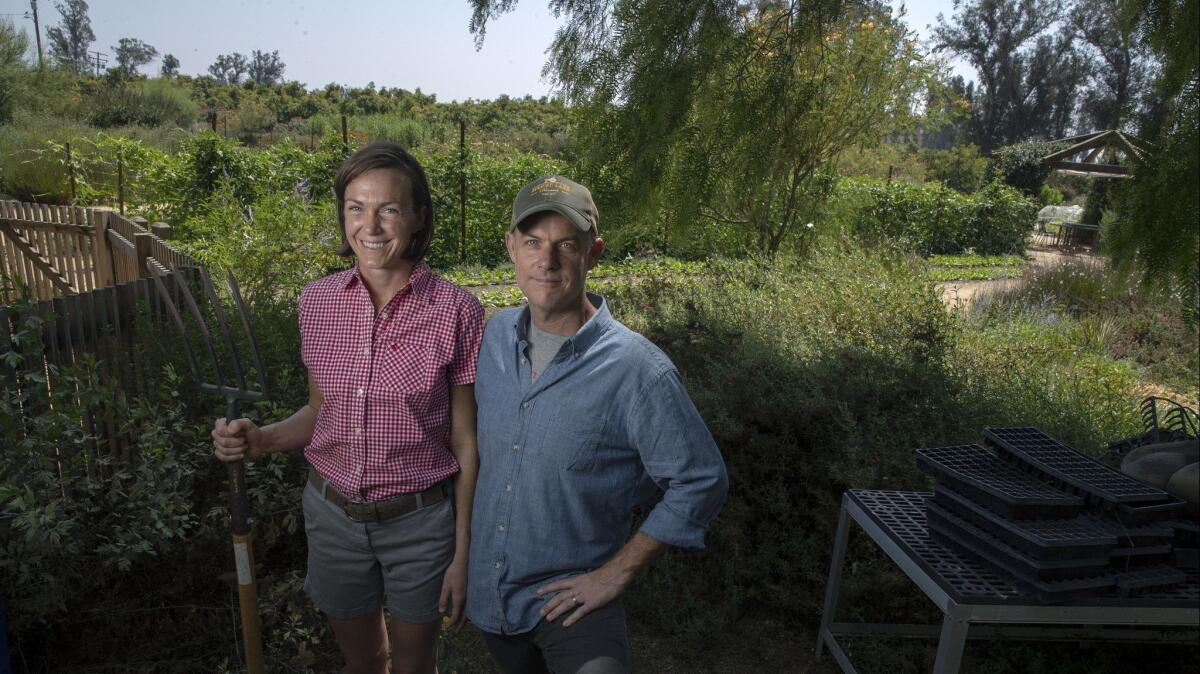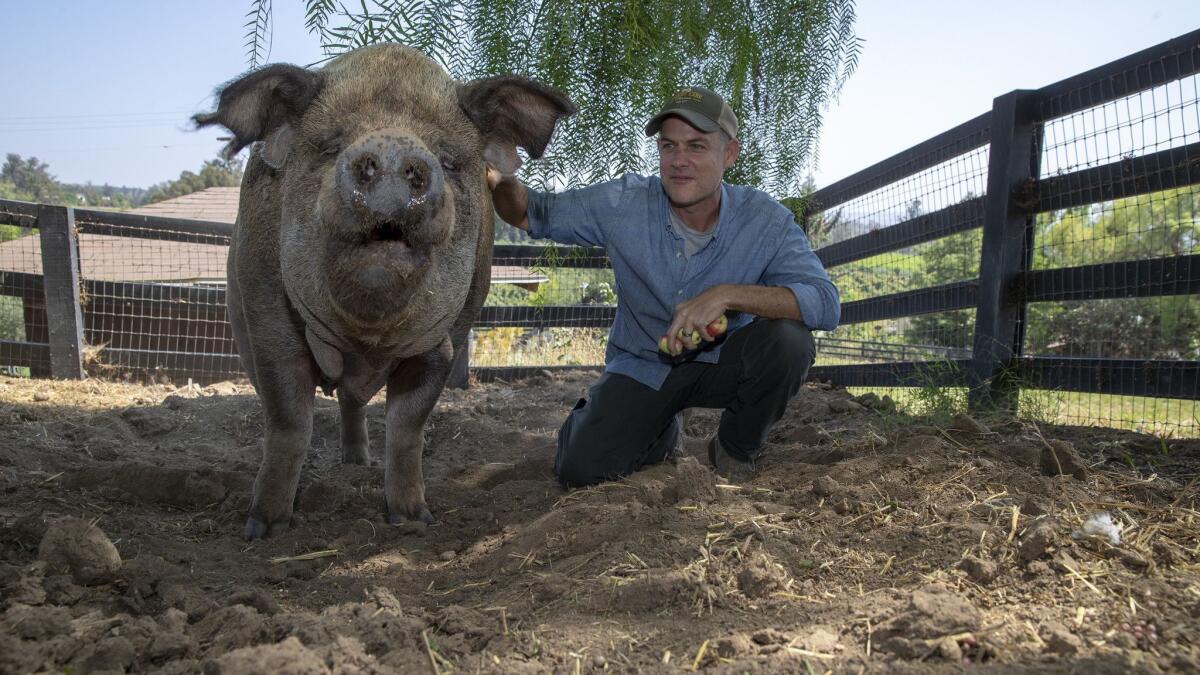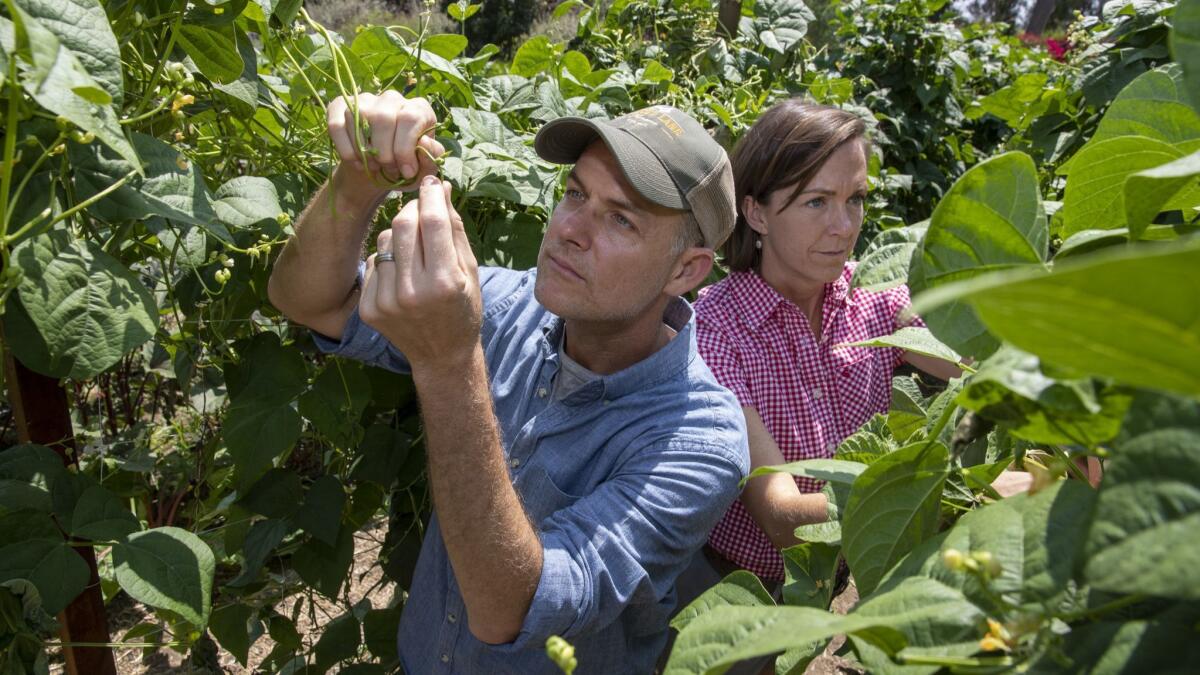An L.A. couple left urban life to start ‘The Biggest Little Farm’ and then made a movie about it

- Share via
It all started with Todd. A flat-coated retriever-border collie mix with commanding blue eyes. He’d been rescued from a bad situation, trapped with over 200 other dogs in cages at a hoarder’s house.
His new adoptive home was far nicer: an apartment in Santa Monica with a newly married couple, John and Molly Chester. But it was still small. And when they left for work — John directed television docuseries, Molly was a traditional foods private chef — Todd would bark. For hours.
The Chesters tried everything to calm him down from citronella bark collars to anxiety vests. Nothing worked, and before long, the couple was served with an eviction notice.
John, 47, and Molly,40, didn’t know what to do. If they found another apartment, surely Todd would just continue barking there. And placing him in another family, after he’d already suffered so much in his early years, was out of the question.
So they decided to do something crazy. For years, they’d dreamed of starting their own farm, but in the way so many of us do — romantically fantasizing about giving up the urban sprawl for a simpler life. They knew nothing about farming; they’d only grown a small tomato plant on their apartment patio. But Todd was the push the Chesters needed. They found a family friend to serve as an investor, and in 2011, purchased 130-acres of land in Moorpark, 50 miles north of Los Angeles.
Their journey is the subject of a new documentary directed by John, “The Biggest Little Farm,” which debuts at the Telluride Film Festival this weekend and screens next week at the Toronto International Film Festival. The film, which is seeking theatrical distribution, isn’t entirely a grass-is-greener story. It depicts the immense struggles the Chesters faced in trying to create an organic, biodynamic business, which they named Apricot Lane Farms.

When the couple arrived on the land, the soil was dead — dry, dusty, uninhabitable. To learn how to make it nutrient-rich again, they hired Alan York, a consultant who was an expert in biomimicry. York preached a style of farming vastly different from what is traditional. Instead of killing pests with chemicals, for instance, York told the Chesters they should rely on things native to the environment — insects, other plants — to do that job. He also advised the couple to grow as many different crops as possible and help the farm become its own thriving ecosystem. While most of the farms in Moorpark focus on lemons and avocados, York persuaded Molly and John to plant those in addition to 75 varieties of stone fruit and a vegetable garden.
At first, it seemed like paradise.
“We, like everybody else, thought this would be an amazing life,” said John, about a week before Telluride. “We were like, why don’t more people do this?”
He was standing on the farm by a pluerry tree — a plum-cherry mix — as Molly picked a couple off a branch, wiped them on her shirt and passed them around to sample.
“And then around year two,” he continued, “we got our ass kicked. It was the lowest point of our lives, individually and as a couple.”

In year two, pests started infiltrating the farm. Birds were eating the stone fruit. Snails clumped on tree trunks. Gophers savaged the roots. Coyotes mauled chickens.
And just when the Chesters needed York most, he wasn’t there. In 2014, he died of pancreatic and liver cancer. And after a few years of roaming free on the land, Todd died too.
The farm was hemorrhaging money. The workers were devoting most of their time to picking snails off trees and clearing dead chickens out of the fields. At one point, John was so desperate he shot a coyote — a decision that filled him with guilt.
“Initially, I’d thought that the hardest thing was going to just be selling the food,” he said. “But I didn’t know that you would fix something to make the land better and that would be the thing to cause the next problem.”
York had always said farming this way would take time. It would be years, he’d told them, before the ecosystem would find its balance. So the Chesters stuck it out.
“It was kind of like, ‘Go big or go home,’ ” Molly said with a shrug. “You had to basically keep throwing in 100%, and you’d get around the corner a little bit. I really wanted to be here forever. I never thought, even when it was hard, that we’d leave.”
And then suddenly, around year five, a kind of rhythm settled over the land. Bees started returning. Barn owls took up residence, swooping down to help with the gopher infestation. Two Great Pyrenees guard dogs protected the chickens from the coyotes. John became more resourceful, even learning via YouTube how to take care of sick animals — draining an abscess or staving off a fever.
“Stuff that should have us running for the hills now? It’s just the rhythm,” he said. “Like, this is the year of the gophers, or this is the year of the tumbleweed, this is the year of morning glory. Some things you have to react to, but for many, you just have to stay really quiet, calm and watch.”
The farm now has 60 employees, many of whom actually live on the premises. Most mornings, John, Molly and their son, 3-year-old Beaudie, wake up around 5:30 a.m. to start organizing the staff. They sell their produce and meat — last week, there were 25 items on the sell sheet — to Erewhon stores plus four farmers markets, and they deliver to a few Southern California restaurants.
But living on the farm, the couple said, has taught them more than just how to grow plants.
“You definitely have to become more comfortable with solitude,” said Molly. “But this way of life — I think people are beginning to yearn for it a little bit because of the disconnection we have [from] the environment. We are of the earth, so we’ll always have a yearning for it if we start to disconnect from it. And I think we have when kids don’t know where milk comes from.”
“Farming, with its scale,” John said, “has detached people from how crazily magical this all is.”

Both seem to derive real pleasure from straightforward farm living, especially how easy it is to pluck something to eat off a tree as they stroll around the land.
“The other day, Beaudie literally said, ‘Mom, I just love that we live somewhere where we get to go outside to get food when we don’t have any,’ ” Molly said.
But lest it all begins to sound too idyllic, there’s the documentary, which John said he wanted to make sure didn’t just “make this life look great and wasn’t honest about the work.”
“In theory,” he said, “it’s amazing, and we’re going to do all this stuff that changes the way farms are viewed. But we walked off the cliff and we got here and we were like, ‘Hey, this is nothing like what people said it was like.’ ”
“And you’d think I would have become more scared of how things are environmentally,” he continued. “But what I didn’t expect was to have this wave of feeling truly taken care of. There is this system that is trying to keep us alive. And the more you are able to work with its rules, the safer I have started to feel.”
Follow me on Twitter @AmyKinLA
More to Read
Only good movies
Get the Indie Focus newsletter, Mark Olsen's weekly guide to the world of cinema.
You may occasionally receive promotional content from the Los Angeles Times.










